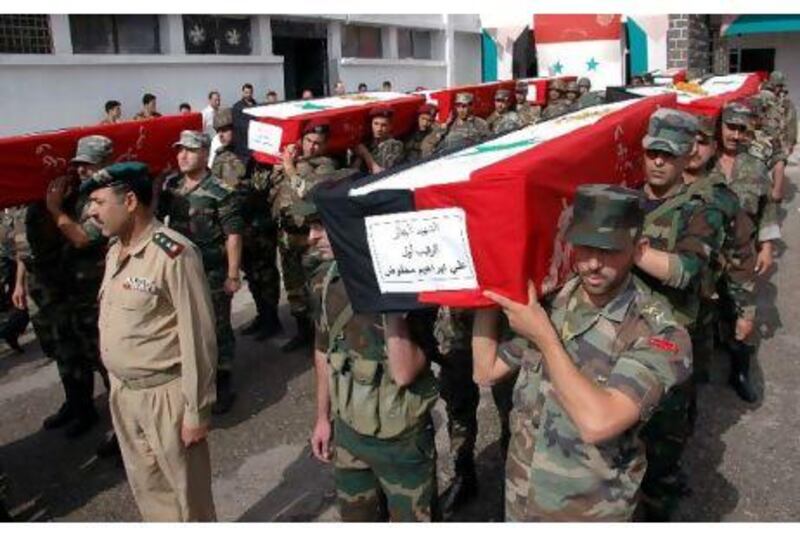ISTANBUL // The highest-ranking officer to defect from Syria's armed forces said yesterday he had taken refuge in Turkey, denying claims that he had been arrested when Syrian troops overran a rebel stronghold, the state-run Anatolian news agency said.
"We live in a safe place in Turkey, I am grateful to the government and people of Turkey. Turkish officials cared about us," Colonel Riad Al Asaad said in an interview.
Armed resistance to President Bashar Al Assad's rule has emerged in recent weeks, six months into a pro-democracy uprising that government forces have tried to crush with violent tactics.
"All of my needs are being met by Turkish officials," said Colonel Asaad, who has emerged as commander of the rebel Syrian Free Army. "The opposition forces in Syria must unite and strengthen their stand until the regime is demolished."
In an interview with Reuters from the Syrian-Turkish border on Friday, Colonel Asaad said more than 10,000 soldiers had deserted the Syrian army and were attacking security forces.
The 50-year-old Air Force officer, who comes from Idlib, a north-west Syrian province bordering Turkey, said Syrian state media were issuing false reports to undermine morale.
"The Syrian regime conducted a brutal operation in Rastan region near Homs city in order to find and arrest me. They claimed that they arrested me at the end of the operation," Colonel Asaad said. "Such stories aim to demoralise the Syrian people."
The rebel colonel's presence in Hatay, now home to several thousand Syrian refugees, will add to tensions between Ankara and Damascus.
The Turkish prime minister, Tayyip Erdogan, plans to visit Hatay soon and is expected to announce sanctions against Syria after having failed to convince his former friend Mr Al Assad to halt attacks on civilians and make urgent political reforms.
"Regarding sanctions, we will make an assessment and announce our road map after the visit to Hatay, setting out the steps," Mr Erdogan told reporters yesterday, adding he expected to visit the region within the week.
Four people were killed yesterday in clashes between Syrian troops and army defectors in the country's north-west, while gunmen shot dead a political activist in the latest in a wave of targeted killings, activists said.
The violence, which stretched from the north of the country to the south, demonstrated the increasingly militarised nature of the uprising and heightened fears that Syria may be sliding toward civil war.
The worst of the fighting yesterday was centred in the Jabal Al Zawiya region in north-west Syria, where clashes have taken place for months. The London-based Syrian Observatory for Human Rights said three soldiers and one civilian were killed in fighting there between government troops and army defectors.
In the south, defectors also attacked an army checkpoint in the village of Dael, wounding one officer, according to the Local Coordination Committees, an activist network.
The Syria-based rights activist Mustafa Osso said government troops were also conducting military operations in the town of Talbiseh in central Syria
Last week, government troops and security personnel, backed by helicopters and tanks, attacked Rastan, where hundreds of insurgents had taken refuge.
Activists in the Rastan area said rebel operations in the area were being led by the Free Officers Movement, which allied with the Syrian Free Army late last month.
Syria's opposition movement has focused on peaceful demonstrations, although recently there have been reports of protesters taking up arms to defend themselves against military attacks.
Mr Al Assad's crackdown has killed some 2,700 people since mid-March, according to a UN estimate. The observatory said gunmen killed Communist activist Mustafa Ahmad, 52, in Homs late on Monday. The killing came a day after gunmen killed the son of Syria's state-appointed cleric, Grand Mufti Ahmad Badreddine Hassoun.
Mr Ahmad's killing was the latest in a series of targeted executions of prominent people, including a nuclear engineer, university professors and physicians. The men, a mix of Alawites, Christians and Shiites, were all killed in a hail of bullets in the past week, most of them in central Homs province, one of the hotbeds of anti-government protests.
The regime has accused "terrorist gunmen" of the killings, while the opposition in turn accused the regime of trying to foment sectarian strife to maintain its grip on power.
Command of Syria's mostly Sunni military is in the hands of officers from Mr Al Assad's Alawite sect, an offshoot of Shiite Islam that also dominates the security apparatus and the ruling elite in the Sunni-majority country.
* Reuters with additional reporting by Associated Press





